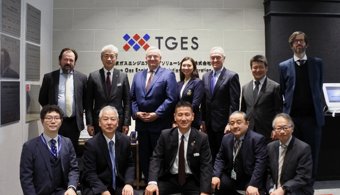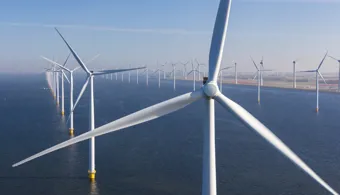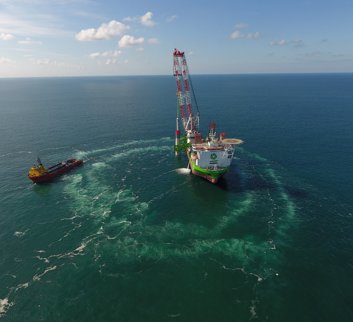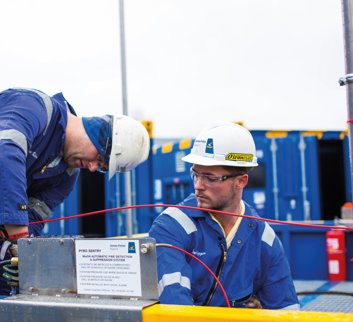
Sustainability is fundamental to what we do at James Fisher and is an integral part of our transformation journey.
We have made good progress implementing our Sustainability Strategy and ESG (Environmental, Social and Governance) into our day-to-day operations and activities but acknowledge that there is still a lot more to do.
The world is facing wide-ranging and significant challenges today and it is essential that we continue to be guided by our Sustainability Strategy to ensure that we build a stronger business for the future.
We are committed to:
- Investing in capabilities and technologies to help deliver a responsible energy transition
- Harnessing the potential of our pioneering employees
- Being good citizens of our local communities
- Becoming a trusted partner for our customers and suppliers
- Driving performance to improve returns for shareholders
What sustainability means to James Fisher:
- Delivering strong, profitable growth
- Building on our 175+ years history
- Having a positive impact on all our stakeholders
- A shared vision and aspiration for change and doing better
Our sustainability strategy's three key pillars
Underpinned by our purpose, the three pillars of our sustainability strategy reinforce each other and, together, support our business growth strategy.

Sustainability frameworks
We are committed to providing comprehensive public disclosure on our Group-wide sustainability performance which is tracked using well established frameworks and with a continual alertness to changes in the external environment.
James Fisher uses a number of recognised sustainability frameworks for reporting. Our current framework alignments are:
We previously adopted the globally recognised Science Based Targets initiatives (SBTi) criteria as these provide companies with a clearly defined path to reduce emissions in line with the Paris Agreement goals.
Following our original notification of commitment to the SBTi in 2021, the SBTi paused validation of fossil fuel sector targets and commitments from fossil fuel companies. We are in the process of determining whether this still applies to James Fisher and intend to report our findings in our 2024 Annual Sustainability Report. In the meantime, we remain committed to the SBTi framework and principles and continue to provide responsible stewardship of oil and gas service provision to our customers.
Greenhouse Gas (GHG) Protocol:
The GHG protocol guides our assessment of the Group's emissions impact of our operations across the entire value chain and identifies where to focus reduction opportunities. The GHG Protocol Corporate Accounting and Reporting Standard and guidance has been used in the development of our Scope 1, Scope 2 and Scope 3 identification, measurement, and reporting methodology.
Streamlined Energy and Carbon Reporting (SECR):
The Group complies with the SECR regulations and is directed by the guidelines set out by the UK government.
Task Force on Climate-Related Financial Disclosure (TCFD):
In addition to the UK government mandating TCFD-aligned disclosure, we acknowledge the need for transparency. This includes the value of providing our stakeholders with visibility of the Group's actual and potential impacts of climate-related risks and opportunities on our businesses, strategy and financial planning - where such information is material. Also how the Company identifies, assesses and manages climate-related risks.
The TCFD framework provides a structured approach for effective climate-related disclosures to better inform on how we are handling climate-related risks, opportunities and the Group's resilience to climate change.
James Fisher and Sons plc (the Company) and its group of companies (the Group) has prepared and is pleased to be making its 2023 climate-related disclosures in accordance with UK Listing Rule 9.8.6(8) and section 414CB of the UK Companies Act 2006 (the Companies Act), both of which align to the TCFD framework.
Carbon Disclosure Project (CDP):
The CDP reporting structure promotes visibility and accountability in our management of climate-related risks and opportunities. We maintained an overall score C in 2023 showing signs of stability whilst we continue to mature our level of disclosure. Our value chain engagement score increased while our score for the 'Emissions reduction initiatives and low-carbon products' category came down from C to -C. All other categories were maintained. A scoring review is scheduled in 2024 to identify key gaps and the new CDP questionnaire structure.
UN Sustainable Development Goals (SDGs):
The SDGs are a call for action in a global partnership. They recognise that ending poverty and other deprivations must go hand-in-hand with strategies that improve health and education, reduce inequality, and spur economic growth - all while tackling climate change and working to preserve our oceans and forests.
James Fisher is undertaking activities that support 10 of the 17 SDGs.
Throughout the year, we undertake activities and initiatives which contribute to all aspects of sustainability as part of our commitment to sustainable change and everyday stewardship and therefore are likely influencing other SDGs.
We are proud to be a signatory to the Powering Net Zero Pact (PNZP).
The PNZP brings together different companies across all tiers of the power sector - including civils, shipping, renewables, electrical engineering, and others - that are committed to a fair and just transition to net zero carbon emissions.
The Group will continue to monitor upcoming changes in policy and regulation relating to climate and general sustainability disclosure, further supporting our sustainability performance.

Download our 2023 Sustainability Report to find out what sustainability means to us and how we'll deliver against our targets.
Our latest news:
Discover the latest stories from across James Fisher

James Fisher and Tokyo Gas Engineering Solutions sign a Joint Collaboration Agreement to deliver offshore wind Operations and Maintenance services in Japan
Read article
Full Year Trading Update for Year Ended 31 December 2023
Read article
Appointment of Independent Non-Executive Director
Read articleJFD secures contract with TechnipFMC enhancing portable hyperbaric rescue capability and global support of diver safety
Read article
James Fisher's young talent receives Aberdeen’s 30 under 30 accolade
Read article
JFD showcases 42 years of subsea innovation to His Majesty King Charles III at Aberdeen’s Global Underwater Hub
Read article
Serviços Marítimos Continental recognised for operational excellence by Petrobras
Read article
JFD launches Agile, its fourth generation submarine rescue system
Read article






 Annual Report 2023
Annual Report 2023